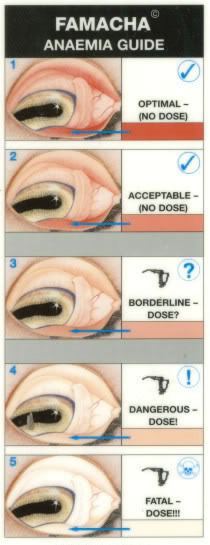Small ruminants are highly susceptible to gastrointestinal parasites. Parasites thrive when weather is moist and mild. Experts warn that this winter’s warmer-than-average temperatures may cause a bigger-than-average parasite problem for goat and sheep producers this year.
In the past, producers were advised to administer aggressive preventative deworming treatment to maintain livestock health. Unfortunately, doing so caused resistance to all classes of deworming drugs. Today, herdsmen are encouraged to selectively deworm only those animals that require treatment. Selective treatment is better for animals, decreases drug resistance and helps keep pastures clean.
Pastured pole worms
Barber’s pole worm is the most prevalent parasite infestation in small ruminants. Sheep and goats ingest the grass-dwelling nematode on pasture. Eggs are excreted in feces. Larvae hatch and climb to the top of grass; grass is eaten and the cycle continues.

FAMACHA scoring
FAMACHA scoring identifies anemia in small ruminants, the main symptom of barber’s pole worm infestation. Dr. Faffa Malan developed a five color FAMACHA scoring chart that corresponds to a sheep or goat’s bottom eyelid color. Pale pink to white indicates anemia; the animal should be dewormed. Robust red to salmon pink indicates the animal does not require deworming at time of test.
FAMACHA is an effective and easy-to-use tool that everyone from backyard hobbyists to large-scale producers can use on the farm.
When diagnosing livestock keep in mind an animal may be anemic for another reason besides parasite infestation. Also, FAMACHA only diagnoses barber’s pole worm infestations. Other worm infestations are not indicated using this tool.
Indicators of parasite infestations in livestock include:
- Diarrhea
- Visible worms
- Bottle jaw
- Too thin, poor body condition
- Dull coat
- Lethargic

Additional prevention strategies
There are several other ways herdsmen can decrease parasite infestations, treatment frequency, drug resistance and pasture contamination.
- Fecal egg counts
- Pasture rotation
- Let dew dry before letting animals out to pasture
- Good health recordkeeping
- Proper deworming dosage based on accurate weights
- Cull animals requiring frequent treatment
- Improve herd/ flock genetics
- Use FAMACHA scoring at least once a month, more frequently during mild and moist weather
How to implement FAMACHA on your farm http://web.uri.edu/sheepngoat/files/FAMACHA-Scoring_Final.pdf












Famacha scoring is supposed to be on the membrane in the eye, not the eyelid.